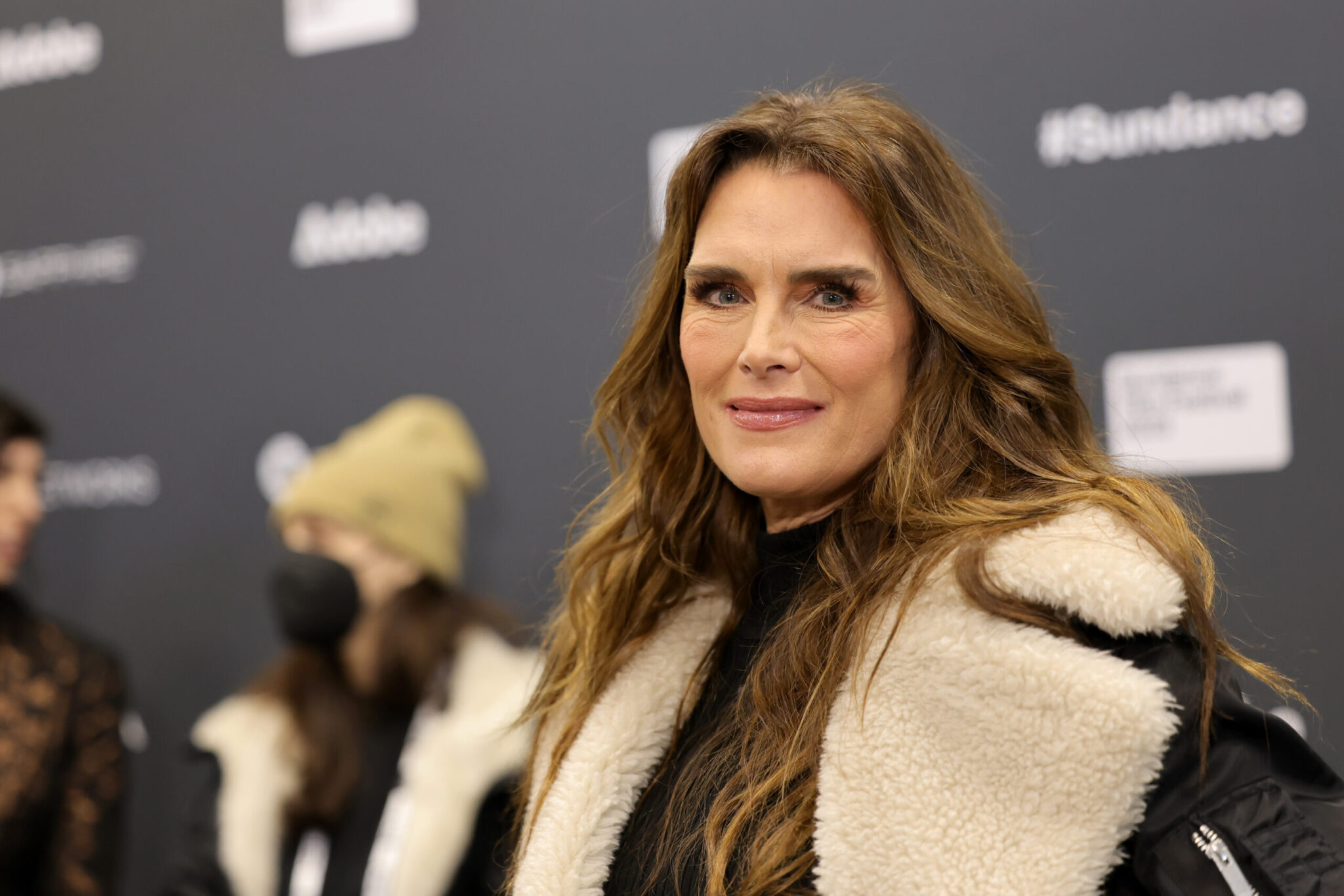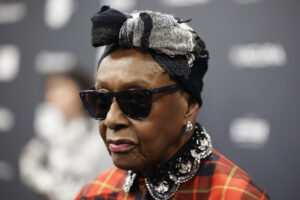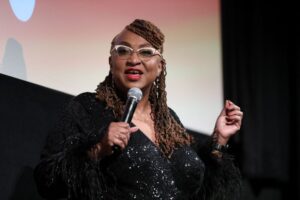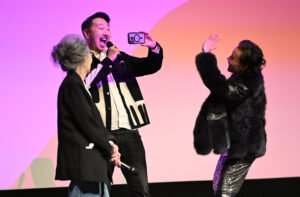PARK CITY, UTAH – JANUARY 20: Brooke Shields attends the 2023 Sundance Film Festival “Pretty Baby: Brooke Shields” Premiere at Eccles Center Theatre on January 20, 2023 in Park City, Utah. (Photo by Amy Sussman/Getty Images)
By Bailey Pennick
One of the most striking moments within Pretty Baby: Brooke Shields — the new two-part documentary from director Lana Wilson (Miss Americana, After Tiller) — is when Shields is having a discussion about consent and agency with her two teenage daughters. They’re sitting around the dinner table, two generations of women working in the entertainment industry, learning from each other and knowing that Shields’ past sometimes is a stark example of how far we’ve come in protecting young artists. And, unfortunately, how far we still need to go.
“The last scene with my girls just blew me away,” says Shields, putting her hand to her heart on the Eccles stage in Park City, Utah. Wilson immediately jumps at the mention of that intimate but pivotal scene within her latest work. “The last scene was really special to film, and we had low expectations and then this conversation just took off,” she recalls. “For some reason, everything just clicked, and it was so amazing to hear what your daughters think about your career… and that they are so comfortable sharing their thoughts and their feelings with you in a way that you would have never with your own mother.” The multitalented artist nods her head, comfortable and willing to discuss any and all aspects of her life and her growth in front of a sold-out crowd.
For those who grew up with Shields, Pretty Baby is a documentary that will reframe the icon through the strength and agency of her own voice — something that she rarely got to use in the past. Scenes revisiting infamous instances like those Calvin Klein ads and The Blue Lagoon don’t feel like taking a trip down memory lane for the actor, and they shouldn’t for viewers either. The deftness with which Wilson weaves Shields’ story with that of the changing perception of women and girls in America is what makes this documentary more than a look to the past, and this was exactly what Shields was looking for in telling her story.
“I think I’ve always made it an important part of my journey, and my growth, to be as honest as I could — not just to the outside [world], but to myself as well — and I’ve done so much work on that. On allowing myself to be vulnerable as a person, because I didn’t want to just become shut down,” Shields explains. “The industry I was in really primes you to be shut down, and I didn’t want to become that victim to that. I’ve been approached to do a doc many times before, and it just wasn’t the right team, the right time, the right tone… but when we were lucky enough to meet Lana, I just thought ‘thank god’ because this is up to a caliber to be able to tell all the aspects of my story.”
“[Brooke] was so much more committed than I ever could imagine,” Wilson concurs. “She had this courage and this fearlessness — her only concern was that [the documentary] wouldn’t be deep enough!” It’s clear from their post-premiere conversation that Wilson and Shields were in lockstep with the importance of telling her story honestly and fully. Shields’ self-awareness is what drives the film, but she’s the first to give credit to Wilson for crafting it to reach beyond her fans: “I think because the nature of my life has been very surface, and that’s always been the focus. That’s why I wanted to go to university, why I wanted to live outside of Hollywood, and I knew that [Lana] would be able to see the depth [of my story], that my life had more meaning than all of this.”
And that’s why hearing from Shields’ daughters is so effective; they represent the new generation who sees their mother as more than just a product or an image — and they see the toxic culture that took advantage of her. Their questions for Shields wake up an audience that just was reimmersed in the hypersexualized ’70s and virginal ’80s through archival footage and film/TV clips. But Pretty Baby isn’t simply a damning look at the entertainment industry; it’s ultimately an uplifting look at a woman who navigated alcoholism within her family, abusive relationships, the never-leaving spotlight of stardom, and postpartum depression and has come through the other side with optimism, grace, and the desire to keep growing.
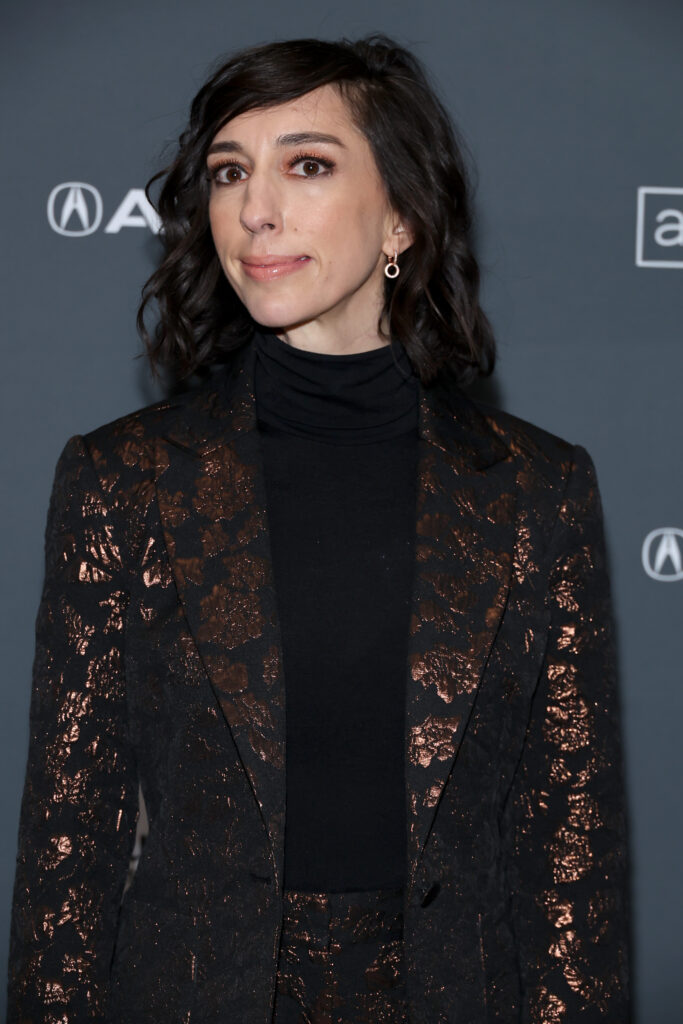
“We’ve come a long way but we haven’t come far at all,” says Wilson. “I recognized something in myself and my own life — and in the lives of the women I know — in that double bind that you were being put in publicly.” Her love and respect for Shields is palpable, as is the admiration of the audience that was uproarious when the star took the stage, wiping away tears between bows. The director continues: “This is someone who was a symbol before she was a person, and it was so hard for her to gain control over her own life. The fact that she was a girl groomed to be an object and, despite all of that, Brooke insisted on getting agency over her mind, over her career, over her personal life, she fought against all the expectations put on her and I found that so remarkable and contemporary in so many ways.”
Shields accepts the importance of speaking her truth and her fight as a way to help and connect with others. “I hope many women will find their experiences echoed in my story,” she reflects. It’s a bigger, more universal story.” She pauses, taking in the surreal moment. “It felt like the right time in my life. My kids are grown up and leaving, and this is a whole new chapter for me.”




